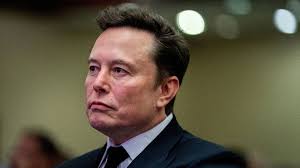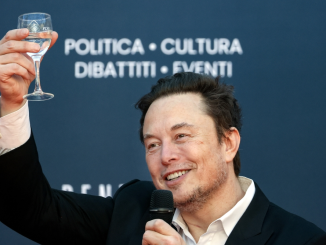
Explosive Allegations Rock Musk Foundation: Charity or Scam?
Introduction: A Shadow Over the Musk Foundation
Elon Musk, the visionary behind Tesla, SpaceX, and numerous other successful ventures, has long been admired for his ambition to revolutionize industries and improve the world. In addition to his corporate achievements, Musk has also made headlines for his philanthropic efforts, particularly through the Musk Foundation, which supports initiatives in areas like renewable energy, science education, and space exploration. However, a recent wave of explosive allegations has cast a dark shadow over the foundation, calling into question the legitimacy of its charitable activities.
Accusations have surfaced, claiming that the Musk Foundation is more about publicity and image-building than actual charitable work. Critics argue that the foundation’s funds have been mismanaged, and that Musk’s philanthropic efforts may not be as altruistic as they appear. With mounting questions about transparency, financial practices, and the true intentions behind Musk’s charitable initiatives, the public is now left wondering: Is the Musk Foundation a legitimate force for good, or is it a cleverly disguised vehicle for self-promotion?
In this article, we will examine the allegations against the Musk Foundation, break down the accusations, and explore the broader implications for Elon Musk’s public image and his approach to philanthropy. Is the Musk Foundation truly fulfilling its charitable mission, or is it a case of a billionaire trying to make a good impression at the expense of genuine social impact?
The Musk Foundation: A Legacy of Giving or a Public Relations Tool?
The Musk Foundation, founded in 2002 by Elon Musk, is designed to support causes that align with Musk’s personal and professional interests, including sustainable energy, education, and space exploration. Over the years, the foundation has donated millions of dollars to various initiatives, including grants to scientific research organizations, educational institutions, and disaster relief efforts.
Musk has been very vocal about his philanthropic goals, frequently expressing his belief that technology and innovation can help solve some of the world’s most pressing issues, such as climate change and inequality. Through his foundation, Musk has positioned himself as a champion of causes like renewable energy, with his foundation’s donations directed toward clean energy advocacy and scientific endeavors that align with the future of humanity.
However, some have begun to question whether the Musk Foundation truly lives up to its charitable mission or if it’s being used as a public relations tool to bolster Musk’s image. After all, Musk is not only a philanthropist but also a media mogul, adept at using the spotlight to further his goals. In this context, many critics have suggested that the foundation’s activities may be more about building Musk’s personal brand than making a meaningful social impact.
These suspicions have been fueled by the recent allegations surrounding the foundation’s financial practices and decision-making processes.
The Allegations: What’s Going On Behind Closed Doors?
The explosive allegations against the Musk Foundation began with an anonymous whistleblower within the organization who accused Musk’s foundation of engaging in questionable financial practices. According to the whistleblower, the foundation’s funds have not been allocated in a transparent or accountable way, with a significant portion of donations being funneled into projects that serve Musk’s own business interests, rather than truly charitable causes.
One of the most significant allegations involves the allocation of large sums of money to projects that overlap with Musk’s personal ventures, such as SpaceX and Tesla. For instance, critics have pointed out that the foundation has made significant donations to organizations linked to Tesla’s mission of advancing electric vehicles, raising questions about whether these funds were used to enhance the company’s public image rather than support independent, non-profit initiatives.
Another point of contention is the foundation’s level of involvement in disaster relief efforts. While Musk has publicly stated that his foundation is dedicated to providing aid during times of crisis, multiple sources claim that the foundation has been slow to act and has been selective in its contributions, prioritizing high-profile donations that generate media attention over more targeted and urgent relief efforts. For example, the foundation made a large donation following the 2018 California wildfires, but critics claim that much of the donation was not used in a timely manner to support the victims, questioning the foundation’s genuine commitment to disaster relief.
Further allegations suggest that the foundation has been misreporting its charitable donations, overstating its contributions to certain causes to improve its public image. Internal documents obtained by sources within the organization reportedly show that the foundation has exaggerated the scale of its involvement in various projects, inflating the impact of its donations in an attempt to portray Musk as a more philanthropic figure than he truly is.
Finally, a troubling accusation involves the foundation’s ties to Musk’s personal business ventures. Critics argue that the Musk Foundation has been used as a tax shelter for Musk’s companies, providing indirect financial benefits to Tesla and SpaceX. Some have even claimed that the foundation’s donations to educational programs and research institutions have been strategically aimed at promoting Musk’s own interests, such as advancing electric vehicle technology or promoting space exploration.
These allegations have sparked a wider debate about the ethics of celebrity philanthropy and the transparency of charitable foundations. Is it possible for a billionaire like Musk to separate his business interests from his charitable endeavors? Or is the line between the two becoming increasingly blurred?
The Fallout: A Hit to Musk’s Public Image
The revelations surrounding the Musk Foundation have had a significant impact on Musk’s public image. For years, Musk has cultivated a persona as a visionary entrepreneur and philanthropist, a man dedicated to improving the world through technological innovation. His role as the head of multiple high-profile companies, including Tesla and SpaceX, has made him one of the most influential figures in the tech world.
However, the recent allegations have raised questions about the authenticity of his philanthropic efforts. Musk has long been lauded for his efforts to combat climate change through Tesla’s electric vehicles and SolarCity’s solar energy solutions. Yet, these new accusations cast doubt on whether Musk’s charitable donations are truly aimed at solving global issues, or if they are part of a calculated strategy to improve his personal and corporate brand.
The backlash from the allegations has been swift. Some critics have called for greater transparency in the Musk Foundation’s financial practices, demanding that the organization open its books to public scrutiny. Others have questioned whether Musk’s wealth—estimated at over $200 billion—should be used to influence the political and corporate landscapes in the ways that some of the foundation’s donations appear to do.
Even supporters of Musk have been forced to confront these allegations. Many have expressed disappointment over the apparent conflict between his public persona as a champion of change and the accusations that his charity might be used for personal gain. As the allegations continue to mount, Musk’s reputation as a philanthropic figure is now under intense scrutiny.
The Bigger Picture: Philanthropy in the Age of Billionaires
The fallout from the Musk Foundation allegations highlights a broader issue in today’s world of celebrity philanthropy. As the wealth gap between the world’s richest individuals and the general population continues to grow, the role of billionaires in charitable giving has become increasingly controversial. Some argue that large-scale philanthropic efforts by billionaires are a way for them to perpetuate their influence and maintain control over their wealth, while others view it as a genuine attempt to improve society.
In Musk’s case, the accusations against the Musk Foundation raise important questions about the ethics of billionaire philanthropy. Is it possible for individuals like Musk to separate their personal interests from their charitable endeavors? Or do their philanthropic efforts inherently serve to enhance their business ventures and public image?
These questions are not unique to Musk. Other tech billionaires, such as Jeff Bezos, Mark Zuckerberg, and Bill Gates, have also faced scrutiny over their charitable giving. Some critics argue that billionaire philanthropy is a form of “philanthrocapitalism,” where the wealthy use their donations to secure political influence and continue amassing wealth. Others contend that, regardless of the motivations behind their donations, the charitable contributions of billionaires can have a positive impact on society.
In the case of Musk, the controversy surrounding the Musk Foundation could lead to calls for greater regulation of private charitable foundations and more stringent rules for how donations are reported and allocated. As the public becomes more aware of the potential for abuse in the world of philanthropy, there may be greater pressure on Musk and other wealthy individuals to ensure that their charitable efforts are genuinely focused on improving the world, rather than furthering their own interests.
What’s Next for the Musk Foundation?
As the allegations continue to mount, the Musk Foundation faces a pivotal moment in its history. To restore trust and credibility, Musk will need to address the accusations head-on, providing transparency about the foundation’s operations and a commitment to ensuring that its funds are used effectively and ethically. This may involve a restructuring of the foundation’s management, an independent audit of its financial activities, and a more transparent approach to reporting its donations.
Musk’s response to the allegations will likely determine the future of his philanthropic efforts. If he is able to address these concerns and demonstrate a genuine commitment to charitable giving, the Musk Foundation may regain its reputation as a force for good. However, if the allegations prove to be true, Musk could face significant backlash that could tarnish his image and undermine the public’s confidence in his future philanthropic endeavors.
Conclusion: Charity or Scam?
The explosive allegations against the Musk Foundation have cast a shadow over Elon Musk’s philanthropic reputation. While his business achievements and technological innovations have earned him global recognition, the questions surrounding the foundation’s activities raise serious concerns about the true nature of his charitable efforts. As Musk and the Musk Foundation navigate this crisis, the public will be watching closely to see whether Musk can rebuild his reputation and prove that his charity is more than just a vehicle for self-promotion.
In the world of billionaires and philanthropy, transparency and accountability will be key to restoring faith in Musk’s charitable endeavors. The outcome of this controversy could have far-reaching implications, not just for Musk, but for the entire world of billionaire philanthropy.




